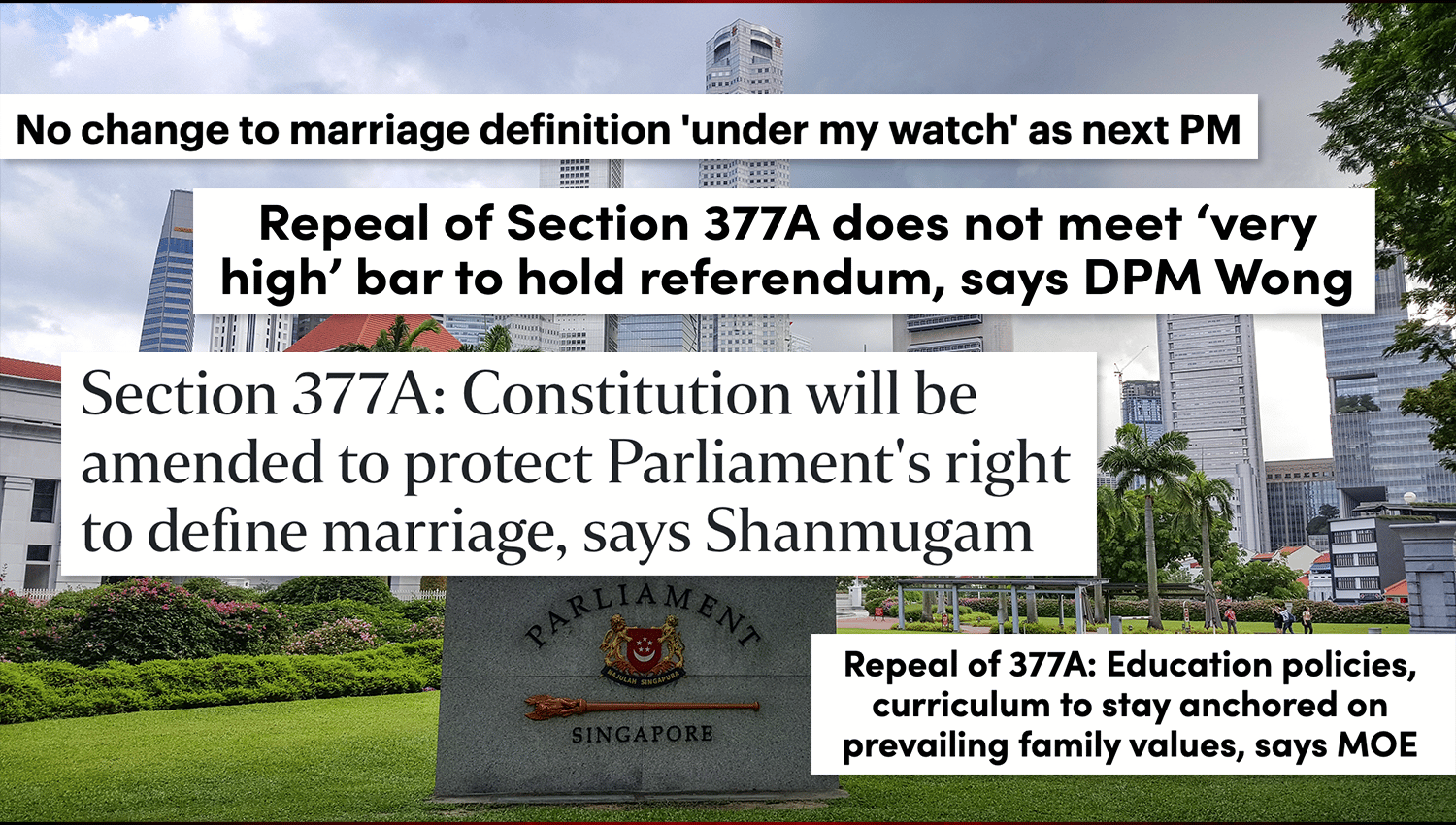
Mr K Shanmugam, Singapore’s Law and Home Affairs Minister, said that the Government has been in “extensive discussions” with various groups – including religious leaders and lesbian, gay, bisexual and transgender (LGBT) representatives – on whether changes might be needed to Section 377A, the law which criminalises sex between men.
In February this year, Section 377A saw a legal challenge dismissed by the apex Court of Appeal, a move which saw pro-LGBT activists call for the nation’s leaders to act “urgently and decisively” to repeal what they called a “redundant law”. The annual Pink Dot event saw politicians from both ruling and opposition party in attendance.
The question of what is to be done with 377A should be debated in Parliament, and not in the courts, said Mr Shanmugam on Saturday (30 July). This escalation of events suggests that this may take place sooner rather than later.
What should the Church do? How should believers respond? Here are 7 questions to help you make sense of what is going on, and how you should react.
ON SECTION 377A: 7 QUESTIONS TO ASK OURSELVES
1. What is at stake?
1 Chronicles 12:32 names those from the tribe of Issachar as “men who understood the times and knew what Israel should do”. As believers, we are always called to gain knowledge, understanding and wisdom (Proverbs 4:5-7). We must know the times, and not keep our heads buried in the sand.
Since it was introduced in 1938, Section 377A has served as a moral signpost for Singapore, as acknowledged both by politicians such as Prime Minister Lee Hsien Loong in 2007, and by the churches in 2018.
As we have been called to contend for righteousness, so must we also display loving kindness.
While Mr Shanmugam has said that the Government is considering how to safeguard the current legal position and definition of marriage as between a man and a woman, possibly in the Singapore Constitution, many religious leaders are concerned that repealing Section 377A would trigger the erosion of other moral lines in the sand.
As a speaker at Pink Dot this year said: “If 377A is repealed, it’s the beginning of a long road to equality, not the end.” This “long road to equality” would cover ground including what is permissible in the sex education curriculum in schools, LGBT portrayals in local media, or ratings for foreign movies with LGBT scenes.
The freedom to practise religion according to established doctrine, which is protected in Article 15 of the Singapore Constitution, could come under threat. Religious bodies could potentially not be at liberty to step down LGBT leaders, excommunicate LGBT members, or reject requests to solemnise gay weddings, as has been the case in other countries where similar laws have been set in place.
One more thing at stake: the witness of the Church.
As we have been called to contend for righteousness, so must we also display loving kindness, just like the God we worship (Jeremiah 9:24). Just like Jesus, we should be equal parts truth and love (Ephesians 4:15).
If our entire approach to the question of Section 377A is solely to battle for what we believe is right, without considering how to speak in love and offer help to those who need it, the witness of the Church as representing a God of love will be compromised.
Which is why, even as we consider what is at stake, we must ask the question …
2. Who is in need?
We’re in the business of helping people. We help people discover Jesus; even when we rebuke or correct, we do so trying to help restore them to a relationship with God (Matthew 18:15, Galatians 6:1).
Every church must be a church of open doors, willing to welcome anyone – regardless of professed gender preferences – who walks through our doors; willing to minister to every broken heart; willing to bless anyone in need.
Pointing people down the path of righteousness – maybe even leading them to repentance – is an act of love.
Believers struggling with same-sex attraction should never have to worry about being ostracised, feared or looked down upon by the church community. In fact, churches should be actively seeking ways to minister to this group with love and understanding.
Loving someone does not mean having to compromise our beliefs and condone behaviour that runs counter to the Word of God. It means recognising the inherent worth of every person as one made in the image of God, and treating them with respect, dignity and compassion.
Pointing people down the path of righteousness – maybe even leading them to repentance – is also an act of love, as it opens the door for their restoration to Father God. Malachi 4:2 describes how the sun of righteousness brings healing in its rising, while Malachi 4:6 links repentance with salvation.
3. What stands against righteousness?
We are to love righteousness and hate wickedness (Psalm 45:7, Hebrews 1:9). We are to warn when people turn away from righteousness (Ezekiel 3:20-21). Righteousness exalts a nation, but sin condemns any people (Proverbs 14:34).
There is an absolute righteousness that we cannot ourselves attain but for the work of Jesus Christ on the Cross. Those of us who are saved are to be used by God thereafter as instruments of righteousness (Romans 6:13) – to do what is right and just in the sight of God.
With this need to seek righteousness (Matthew 6:33) in mind, consider of Section 377A:
- Does this law help people to see what is right by God?
- Does this law help people to do what is right by God?
- Would its repeal lead to a rise in wickedness?
- Is it the only floodgate against wickedness?
- What more can we do as the church to cultivate righteousness in this realm?
4. Should believers concern ourselves with a nation’s laws?
In Paragraph 24 of the White Paper on the Maintenance of Religious Harmony (1990), it is stated that “it is neither possible nor desirable to compartmentalise completely the minds of voters into secular and religious halves, and ensure that only the secular mind influences his voting behaviour “.
In Paragraph 22, it adds: “Members of religious groups may, of course, participate in the democratic political process as individual citizens.“
The believer who sees unrighteousness in the land but does not call it out will be held accountable for the blood of the wicked.
In other words, there is no citizen – Christian or otherwise – whose choices are not personally influenced by their belief system or faith. In a multi-religious society like Singapore, we engage with society stating our personal beliefs, but with mutual respect and dignity.
In the case of Section 377A, the debate is not political, in the sense of standing for one party or another. This is about legislation, which cuts across all parties and all peoples, and which reflects the moral code of our society. Politicians – who can amend legislation – are democratically elected representatives of the people. All citizens are free and encouraged to represent our personal viewpoints to them.
Is there Biblical precedent? Yes. Daniel intervening against what he saw as a “harsh decree” (Daniel 2:15). Nehemiah presenting a request before King Artaxerxes (Nehemiah 2:5). Jonah preaching repentance, whose warning reached the King of Nineveh (Jonah 3:6). Paul exercising his right as a citizen to express his views (Acts 21:39).
In fact, the believer who sees unrighteousness in the land but does not call it out will be held accountable for the blood of the wicked (Ezekiel 33:8).
5. What if we suffer for voicing our beliefs?
Take it as a spiritual compliment – even a blessing, as it says in 1 Peter 3:14-18 –
“Even if you should suffer for what is right, you are blessed. Do not fear their threats; do not be frightened … For it is better, if it is God’s will, to suffer for doing good than for doing evil.”
Or again in 1 Peter 4:12-19 –
Dear friends, do not be surprised at the fiery ordeal that has come on you to test you, as though something strange were happening to you. But rejoice inasmuch as you participate in the sufferings of Christ, so that you may be overjoyed when his glory is revealed.
If you are insulted because of the name of Christ, you are blessed, for the Spirit of glory and of God rests on you … If you suffer as a Christian, do not be ashamed, but praise God that you bear that name … So then, those who suffer according to God’s will should commit themselves to their faithful Creator and continue to do good.
Remember, this is Peter, who knew a thing or two about hiding when people asked him if he knew Jesus. In the night before Jesus was crucified, as the rooster crowed, he learnt that suffering for Jesus is far better than disavowing Him when the world comes calling.
And so, even if airing your views and standing up for righteousness may place you in uncomfortable positions and awkward conversations, we must not shy away, knowing that our participation in such suffering brings us a step closer to knowing Christ (Philippians 3:10-11).
6. What are the consequences of not doing all this?
First, we will face the consequences of not having a say in the debate.
What is shaping your view of Section 377A? The suasion of man? The deceitful heart? Or the will of God?
In the case of Section 377A, pro-LGBT activists have stated they hope to see changes in school sex education, health education, housing policy and media representation. While there are “no immediate plans” to mount a legal challenge against the definition of marriage as between a man and a woman, this does not preclude plans in the future, as has been seen in many countries worldwide.
But more so, in the final judgment, we will have to answer to God as we give an account of our actions in our life (1 Peter 4:5).
Did you love righteousness and hate wickedness? Did you open the doors of your church to everyone? Even as you ministered to them, did you lovingly point them to repentance? Were you willing to suffer for Christ, or were you ashamed of Him?
7. Who is your Lord?
What do we ultimately submit to? The whims and ways of the world? Or the Word of God?
What is shaping your view of Section 377A? The suasion of man? The deceitful heart? Or the will of God?
What determines your willingness to speak up? The fear of man? Or the fear of God?
Choose this day whom you will serve.
RELATED ARTICLES:
Church bodies in Singapore issue advisories on need to keep Section 377A
How can the church respond better to those with same-sex attraction?
We are an independent, non-profit organisation that relies on the generosity of our readers, such as yourself, to continue serving the kingdom. Every dollar donated goes directly back into our editorial coverage.
Would you consider partnering with us in our kingdom work by supporting us financially, either as a one-off donation, or a recurring pledge?
Support Salt&Light




